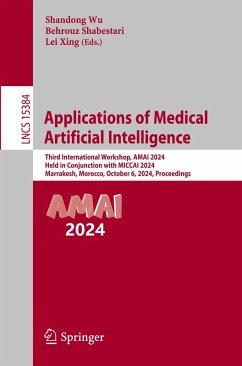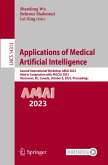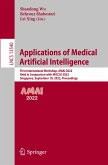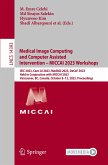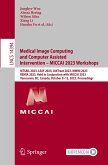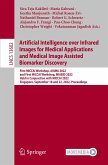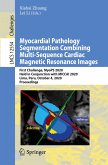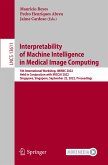Applications of Medical Artificial Intelligence
Third International Workshop, AMAI 2024, Held in Conjunction with MICCAI 2024, Marrakesh, Morocco, October 6, 2024, Proceedings
Herausgegeben:Wu, Shandong; Shabestari, Behrouz; Xing, Lei
Applications of Medical Artificial Intelligence
Third International Workshop, AMAI 2024, Held in Conjunction with MICCAI 2024, Marrakesh, Morocco, October 6, 2024, Proceedings
Herausgegeben:Wu, Shandong; Shabestari, Behrouz; Xing, Lei
- Broschiertes Buch
- Merkliste
- Auf die Merkliste
- Bewerten Bewerten
- Teilen
- Produkt teilen
- Produkterinnerung
- Produkterinnerung
This book constitutes the refereed proceedings of the Third International Workshop on Applications of Medical Artificial Intelligence, AMAI 2024, held in conjunction with MICCAI 2024, in Marrakesh, Morocco on October 6th, 2024.
The volume includes 24 papers which were carefully reviewed and selected from 59 submissions. The AMAI 2024 workshop created a forum to bring together researchers, clinicians, domain experts, AI practitioners, industry representatives, and students to investigate and discuss various challenges and opportunities related to applications of medical AI.
Andere Kunden interessierten sich auch für
![Applications of Medical Artificial Intelligence Applications of Medical Artificial Intelligence]() Applications of Medical Artificial Intelligence70,99 €
Applications of Medical Artificial Intelligence70,99 €![Applications of Medical Artificial Intelligence Applications of Medical Artificial Intelligence]() Applications of Medical Artificial Intelligence43,99 €
Applications of Medical Artificial Intelligence43,99 €![Medical Image Computing and Computer Assisted Intervention ¿ MICCAI 2023 Workshops Medical Image Computing and Computer Assisted Intervention ¿ MICCAI 2023 Workshops]() Medical Image Computing and Computer Assisted Intervention ¿ MICCAI 2023 Workshops51,99 €
Medical Image Computing and Computer Assisted Intervention ¿ MICCAI 2023 Workshops51,99 €![Medical Image Computing and Computer Assisted Intervention - MICCAI 2023 Workshops Medical Image Computing and Computer Assisted Intervention - MICCAI 2023 Workshops]() Medical Image Computing and Computer Assisted Intervention - MICCAI 2023 Workshops51,99 €
Medical Image Computing and Computer Assisted Intervention - MICCAI 2023 Workshops51,99 €![Artificial Intelligence over Infrared Images for Medical Applications and Medical Image Assisted Biomarker Discovery Artificial Intelligence over Infrared Images for Medical Applications and Medical Image Assisted Biomarker Discovery]() Artificial Intelligence over Infrared Images for Medical Applications and Medical Image Assisted Biomarker Discovery43,99 €
Artificial Intelligence over Infrared Images for Medical Applications and Medical Image Assisted Biomarker Discovery43,99 €![Myocardial Pathology Segmentation Combining Multi-Sequence Cardiac Magnetic Resonance Images Myocardial Pathology Segmentation Combining Multi-Sequence Cardiac Magnetic Resonance Images]() Myocardial Pathology Segmentation Combining Multi-Sequence Cardiac Magnetic Resonance Images39,99 €
Myocardial Pathology Segmentation Combining Multi-Sequence Cardiac Magnetic Resonance Images39,99 €![Interpretability of Machine Intelligence in Medical Image Computing Interpretability of Machine Intelligence in Medical Image Computing]() Interpretability of Machine Intelligence in Medical Image Computing43,99 €
Interpretability of Machine Intelligence in Medical Image Computing43,99 €-
-
-
This book constitutes the refereed proceedings of the Third International Workshop on Applications of Medical Artificial Intelligence, AMAI 2024, held in conjunction with MICCAI 2024, in Marrakesh, Morocco on October 6th, 2024.
The volume includes 24 papers which were carefully reviewed and selected from 59 submissions. The AMAI 2024 workshop created a forum to bring together researchers, clinicians, domain experts, AI practitioners, industry representatives, and students to investigate and discuss various challenges and opportunities related to applications of medical AI.
Hinweis: Dieser Artikel kann nur an eine deutsche Lieferadresse ausgeliefert werden.
The volume includes 24 papers which were carefully reviewed and selected from 59 submissions. The AMAI 2024 workshop created a forum to bring together researchers, clinicians, domain experts, AI practitioners, industry representatives, and students to investigate and discuss various challenges and opportunities related to applications of medical AI.
Hinweis: Dieser Artikel kann nur an eine deutsche Lieferadresse ausgeliefert werden.
Produktdetails
- Produktdetails
- Lecture Notes in Computer Science 15384
- Verlag: Springer / Springer Nature Switzerland / Springer, Berlin
- Artikelnr. des Verlages: 978-3-031-82006-9
- Seitenzahl: 280
- Erscheinungstermin: 8. Februar 2025
- Englisch
- Abmessung: 235mm x 155mm x 16mm
- Gewicht: 429g
- ISBN-13: 9783031820069
- ISBN-10: 3031820061
- Artikelnr.: 72213886
- Herstellerkennzeichnung Die Herstellerinformationen sind derzeit nicht verfügbar.
- Lecture Notes in Computer Science 15384
- Verlag: Springer / Springer Nature Switzerland / Springer, Berlin
- Artikelnr. des Verlages: 978-3-031-82006-9
- Seitenzahl: 280
- Erscheinungstermin: 8. Februar 2025
- Englisch
- Abmessung: 235mm x 155mm x 16mm
- Gewicht: 429g
- ISBN-13: 9783031820069
- ISBN-10: 3031820061
- Artikelnr.: 72213886
- Herstellerkennzeichnung Die Herstellerinformationen sind derzeit nicht verfügbar.
Exploring CNN and Transformer-based Architectures to Improve Image Segmentation for Chronic Wound Measurement.- From Pixel Scores to Clinical Impacts: The Implicit Choices in FROC Metric Design and Their Consequences.- Head CT Scan Motion Artifact Correction via Diffusion-Based Generative Models.- SP-NAS: Surgical Phase Recognition-based Navigation Adjustment System for distal gastrectomy.- Transforming Multimodal Models into Action Models for Radiotherapy.- Enhanced Interpretability in Histopathological Images via Combined Tissue and Cell-Level Graph Analysis.- Targeted Visual Prompting for Medical Visual Question Answering.- Deep Learning for Resolving 3D Microstructural Changes in the Fibrotic Liver.- Predicting Falls through Muscle Weakness from a Single Whole Body Image: A Multimodal Contrastive Learning Framework.- Optimizing ICU Readmission Prediction: A Comparative Evaluation of AI Tools.- Source Matters: Source Dataset Impact on Model Robustness in Medical Imaging.- Evaluating Perceived Workload, Usability and Usefulness of Artificial Intelligence Systems in Low-Resource Settings: Semi-Automated Classification and Detection of Community Acquired Pneumonia.- Incremental Augmentation Strategies for Personalised Continual Learning in Digital Pathology Contexts.- Assessing Generalization Capabilities of Malaria Diagnostic Models from Thin Blood Smears.- Automated Feedback System for Surgical Skill Improvement in Endoscopic Sinus Surgery.- Quantifying Knee Cartilage Shape and Lesion: From Image to Metrics.- RadImageGAN - A Multi-modal Dataset-Scale Generative AI for Medical Imaging.- Ensemble-KAN: Leveraging Kolmogorov Arnold Networks to Discriminate Individuals with Psychiatric Disorders from Controls.- SCIsegV2: A Universal Tool for Segmentation of Intramedullary Lesions in Spinal Cord Injury.- EHRmonize: A Framework for Medical Concept Abstraction from Electronic Health Records using Large Language Models.- Evaluating the Impact of Pulse Oximetry Bias in Machine Learning under Counterfactual Thinking.- Normative Modeling with Focal Loss and Adversarial Autoencoders for Alzheimer's Disease Diagnosis and Biomarker Identification.- One-Shot Medical Video Object Segmentation via Temporal Contrastive Memory Networks.- Data-Efficient Radiology Report Generation via Similar Report Features Enhancement.
Exploring CNN and Transformer-based Architectures to Improve Image Segmentation for Chronic Wound Measurement.- From Pixel Scores to Clinical Impacts: The Implicit Choices in FROC Metric Design and Their Consequences.- Head CT Scan Motion Artifact Correction via Diffusion-Based Generative Models.- SP-NAS: Surgical Phase Recognition-based Navigation Adjustment System for distal gastrectomy.- Transforming Multimodal Models into Action Models for Radiotherapy.- Enhanced Interpretability in Histopathological Images via Combined Tissue and Cell-Level Graph Analysis.- Targeted Visual Prompting for Medical Visual Question Answering.- Deep Learning for Resolving 3D Microstructural Changes in the Fibrotic Liver.- Predicting Falls through Muscle Weakness from a Single Whole Body Image: A Multimodal Contrastive Learning Framework.- Optimizing ICU Readmission Prediction: A Comparative Evaluation of AI Tools.- Source Matters: Source Dataset Impact on Model Robustness in Medical Imaging.- Evaluating Perceived Workload, Usability and Usefulness of Artificial Intelligence Systems in Low-Resource Settings: Semi-Automated Classification and Detection of Community Acquired Pneumonia.- Incremental Augmentation Strategies for Personalised Continual Learning in Digital Pathology Contexts.- Assessing Generalization Capabilities of Malaria Diagnostic Models from Thin Blood Smears.- Automated Feedback System for Surgical Skill Improvement in Endoscopic Sinus Surgery.- Quantifying Knee Cartilage Shape and Lesion: From Image to Metrics.- RadImageGAN - A Multi-modal Dataset-Scale Generative AI for Medical Imaging.- Ensemble-KAN: Leveraging Kolmogorov Arnold Networks to Discriminate Individuals with Psychiatric Disorders from Controls.- SCIsegV2: A Universal Tool for Segmentation of Intramedullary Lesions in Spinal Cord Injury.- EHRmonize: A Framework for Medical Concept Abstraction from Electronic Health Records using Large Language Models.- Evaluating the Impact of Pulse Oximetry Bias in Machine Learning under Counterfactual Thinking.- Normative Modeling with Focal Loss and Adversarial Autoencoders for Alzheimer's Disease Diagnosis and Biomarker Identification.- One-Shot Medical Video Object Segmentation via Temporal Contrastive Memory Networks.- Data-Efficient Radiology Report Generation via Similar Report Features Enhancement.

